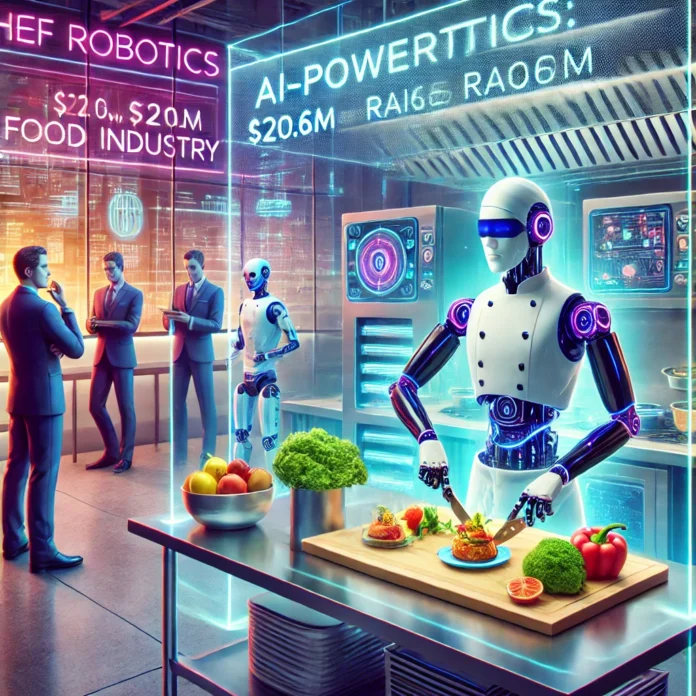In a groundbreaking development for the robotics industry, San Francisco-based Chef Robotics announced on April 22, 2025, a $20.6 million Series A funding round led by Avataar Ventures, alongside $22.5 million in equipment financing from Silicon Valley Bank. This high-impact milestone, reported by CNBC and Business Insider, underscores the growing convergence of artificial intelligence (AI) and robotics to address labor shortages and revolutionize food processing. Chef Robotics’ AI-powered robotic arms, designed to work alongside humans in food assembly lines, are poised to transform the industry by enhancing efficiency, safety, and scalability.
Chef Robotics: AI Meets Food Production
Chef Robotics, founded in 2019 by CEO Rajat Bhageria, tackles a critical challenge in the food industry: labor shortages driven by high turnover in repetitive, low-wage roles. As Bhageria noted in a CNBC interview, food processing plants often rely on workers performing monotonous tasks like scooping ingredients in cold, 34-degree Fahrenheit rooms for hours. Chef’s solution is a fleet of AI-driven robotic arms that integrate seamlessly into assembly lines, performing tasks such as portioning, spreading ingredients, and packaging meals with human-like precision.
Unlike traditional automated dispensers, Chef’s robots leverage generative AI to reason about their surroundings, adapt to varying ingredients, and handle complex tasks. The company has built a robust dataset from manipulating nearly 2,000 ingredients, enabling its robots to produce over 44 million food servings across North American plants. This “moat” of training data, as Bhageria calls it, allows Chef to scale rapidly, addressing the unique demands of food processing, where ingredients vary in texture, size, and temperature.
A Game-Changer for the Food Industry
The food sector faces mounting pressures, including labor shortages, rising costs, and consumer demand for efficiency. According to the U.S. Chamber of Commerce, cited in Business Insider, low wages and harsh working conditions exacerbate turnover in food processing plants. Chef’s robots offer a compelling solution by automating repetitive tasks, reducing reliance on temporary workers, and enabling companies to redirect human labor to higher-skilled roles. This aligns with broader trends in AI-powered robotics, as seen in companies like Amazon, which has deployed over 750,000 robots in its warehouses, and Dexterity, with its super-humanoid robot Mech.
The $20.6 million funding will accelerate Chef’s expansion, allowing it to deploy more robots and refine its AI models. The additional $22.5 million in equipment financing from Silicon Valley Bank will support hardware development, ensuring the robots meet the rigorous demands of industrial environments. Early adopters, including major food processing plants, have reported significant improvements in throughput and consistency, highlighting the technology’s potential to lower costs and enhance workplace safety.
The Bigger Picture: AI Robotics and Economic Impact
Chef Robotics’ success reflects a broader surge in AI-powered robotics, which Forbes describes as a “quieter revolution” transforming industries. The global robotics market is projected to grow significantly, with Citigroup estimating humanoid robot sales could reach $209 billion by 2035. This growth is fueled by advancements in AI, particularly large language models and agentic systems, which enable robots to interact intuitively with humans and adapt to dynamic environments.
However, the rise of AI robotics also raises economic and ethical questions. While robots like Chef’s alleviate labor shortages, they spark debates about job displacement. Bhageria counters this concern, arguing that automation creates opportunities for upskilling workers into roles like robot maintenance and programming. Additionally, the environmental impact of scaling robotic systems, including energy consumption, remains a point of discussion, though Chef’s focus on efficiency may mitigate some concerns.
Regulatory and Ethical Horizons
As AI robotics advances, regulatory frameworks are evolving to keep pace. Recent developments, such as the UK’s AI Growth Zones and the UAE’s exploration of AI-drafted laws, signal global efforts to balance innovation with oversight. In the U.S., discussions around AI’s role in industries like food processing highlight the need for policies addressing data privacy, workplace safety, and equitable access to automation technologies. Chef Robotics’ open approach to sharing its progress, as seen in its engagement with industry media, positions it as a leader in fostering transparent dialogue about these issues.
Looking Ahead
Chef Robotics’ $20.6 million funding round marks a pivotal moment for AI-powered robotics, with the food industry as a proving ground for transformative automation. By addressing labor shortages and enhancing efficiency, Chef’s robots are setting a new standard for human-robot collaboration. As the company scales, its success could inspire further investment in robotics startups, accelerating the adoption of AI-driven solutions across sectors.
For businesses, Chef Robotics offers a glimpse into a future where AI and robotics converge to solve real-world challenges. Yet, as the industry evolves, stakeholders must navigate the ethical and economic implications to ensure automation benefits both companies and workers. With its innovative approach and strong financial backing, Chef Robotics is well-positioned to lead this revolution, reshaping the food industry and beyond.




